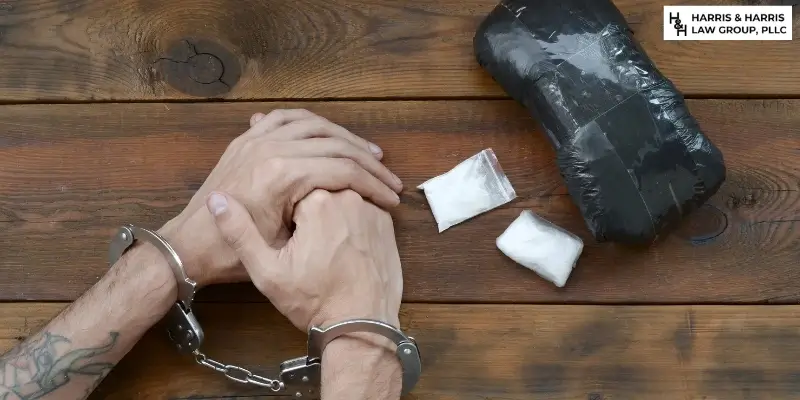Being accused of any drug crime in Texas is a serious matter. You need insight from an experienced lawyer as soon as possible. With the help of Harris & Harris Law Group, PLLC, you can get the defense that you deserve. Contact us today and allow our team to review the circumstances of your charges to build a defense strategy that works for you.
Dallas Drug Possession Lawyer

Dallas Drug Possession Attorney
Drug offenses are taken very seriously in Texas. If you or someone you know is facing drug possession charges, you should seek the help of a Dallas drug possession lawyer. Being accused of drug possession in Texas is an overwhelming experience, and it’s important to have insights about your rights moving forward. Texas law contains a wide range of drug-related offenses, from minor traffic ticket paraphernalia charges up to first-degree felony manufacturing charges.
With the help of an experienced attorney from Harris & Harris Law Group, PLLC, you can build a defense that works for the charges you face. Our team understands that each case is unique and should be approached with an individualized defense strategy. We use our knowledge and experience to help you reach an acquittal, reduction of charges, or an outright dismissal. You deserve the help of a legal team that puts your interests first.
Drug Schedules in Texas
Drug schedules were created federally to classify controlled substances. The determinations are dependent on their potential for abuse, their medical use, and their level of safety. The schedules help establish the guidelines law enforcement, healthcare professionals, and judicial authorities use in relation to each substance. The penalties and regulations are enforced accordingly.
The Federal Controlled Substances Act, established by the Drug Enforcement Administration, is the official classifier when it comes to drug scheduling. Drugs are classified into five main categories, with Schedule One as the most restrictive and Schedule Five as the least. Each schedule is based on the potential for abuse, the accepted medical use, and the likelihood of addiction for each substance.
The following are the scheduled substances in Texas:
- Schedule 1. These are the substances deemed to have the highest potential for abuse and have no accepted medical use. Some examples of these substances include heroin, LSD, and ecstasy, among others.
- Schedule 2. These substances also present a high risk of abuse, but they have some accepted medical use. People who use them have a high risk of developing physical and psychological dependence. These substances could include methamphetamine, cocaine, and some opioids.
- Schedule 3. These substances have a moderate potential for abuse with some medical benefits. Some examples include ketamine, anabolic steroids, and some barbiturates.
- Schedule 4. These substances have a lower potential for abuse when compared to schedule one, two, and three, but they do have some accepted medical use. People who use these have a low risk of developing a dependence. These drugs include Ambien, Xanax, and Valium.
- Schedule 5. These substances have the lowest potential for abuse with the most accepted medical benefits. People are unlikely to develop a dependence on these drugs. These substances could include controlled testosterone and cough syrups with codeine.
Possession of Marijuana (Cannabis)
Although some states have begun the legalization of the sale and possession of marijuana (or cannabis), Texas is not currently one of them. If you have been caught in the sale or possession of marijuana, determining whether it is a felony or a misdemeanor will depend on the amount found in your possession. One of the most common marijuana charges is a first-time offense possession of marijuana in an amount equal to or less than two ounces.
Although first offenders of possession of marijuana less than or equal to 2 oz are punishable by probation or a maximum jail sentence of 180 days, many first time offenders are able to arrange an eventual dismissal of charges. Although we cannot guarantee any specific result, we will fight for the best possible outcome for your charge.
Possession of a Controlled Substance
Individuals may be charged with possession of a controlled substance when the police believe that he or she intentionally or knowingly possessed an illegal substance or a legal substance without an appropriate prescription from a licensed physician. Specific types of drug possession can include:
- Possession of cocaine: Possession, distribution, or manufacturing and delivering of cocaine can be punished very harshly in Texas. If you are convicted of possession or distribution of cocaine, your freedom could be at risk. Texas views cocaine as one of the most dangerous drugs, and the penalties associated with those caught can be severe. Individuals could face substantial fines and prison time for even a relatively small amount of cocaine.
- Possession of ecstasy: The manufacture, delivery, or possession of this substance is a felony offense at minimum. It’s considered a group 2 controlled substance, and even the smallest amount could get you a felony conviction and land you in jail. You could potentially be dealing with a felony conviction and paying serious fines. This is why it’s so important to seek the help of a drug crime lawyer.
- Possession of heroin. Possession of heroin is a felony offense in Texas, no matter the amount. The penalties can vary depending on the amount of heroin found, but you will potentially face incarceration. Depending on the amount of heroin you’re found with, you could also be charged with manufacturing or delivery, which would bring in even greater penalties. Prior criminal history is also a factor in all drug possession charges.
The penalties for these types of possession can vary depending on the circumstances of the charges against you. Reviewing these details with your Dallas Drug Possession Lawyer will help you understand the types of penalties that you could face.
Possession with Intent to Deliver
In Texas, possession with the intent to deliver is the legal way of referring to the actual or intended transfer or sale of drugs to another individual. Delivery charges typically apply when a person is found to be in possession of a higher amount of drugs than would be typical for personal use.
Many times, police find other evidence of intent to deliver, such as scales, baggies, cutting agents, and large sums of cash. If the police find evidence of production or preparation of a controlled substance other than marijuana, individuals can even be faced with a manufacturing a controlled substance charge. To deal with these serious allegations, you need a strong advocate on your side. Contact us today to learn more about your rights and next steps.
Drug Possession Accusations Don’t Have To Ruin Your Future.
Controlled substance cases frequently turn to the “intentionally or knowingly” aspect of the charge. This determination is made by looking at the person’s care, custody, control, and/or management of the substance. Punishment ranges will vary depending on the type of controlled substance, the amount possessed, and the individual’s criminal history. Contact us now for help with your controlled substance case in Dallas, Texas.
FAQs
Q: How Do You Beat a Drug Possession Charge in Texas?
A: There are several possible ways to beat a drug possession charge in Texas, depending on the details and complexity of your case. The greatest chance of successfully defending against a drug possession charge is with the help of an experienced drug crime attorney. An attorney can review the details of your case and determine a proper legal defense tailored to defend you.
Q: Can a Drug Crime Conviction Cost Me My Driver’s License in Texas?
A: A drug crime conviction in Texas could cost you your driver’s license. Under the Texas Controlled Substances Act, any drug crime conviction could lead to a driver’s license suspension of up to six months. The length of this suspension is usually up to the court’s discretion. It is not necessarily mandatory. If you don’t have a driver’s license, a conviction could cause you to be denied your license for up to 180 days. This is considered an order or prohibition.
Q: Will I Lose My Job If Convicted of a Drug Crime in Texas?
A: There is no guarantee that you will keep your job after a drug conviction in Texas. Additionally, you may find it more difficult to find employment once you have a drug crime conviction on your record. As many employers run background checks, it’s likely that you won’t be able to hide your drug conviction from your future employer. An attorney can help you avoid convictions that could lead to such instances.
Q: Can Law Enforcement Search My Car If They Think I Possess an Illegal Substance?
A: Law enforcement may search your car under the right circumstances, such as if you provide your consent, you’ve been placed under arrest, there is probable cause to support the search, or law enforcement believes the search is necessary to stop a threat or danger. If law enforcement officers illegally search your car, it could be used as evidence in your legal defense and substantially affect your case. You should speak with an attorney promptly about your case.
Q: What Are the Penalties for Drug Crimes in Texas?
A: The penalties for drug crimes in Texas can vary depending on the specifics of the crime. For example, the seriousness of the charge, the number of illegal substances you are caught with, and if there was any violence involved will all factor into the penalty determination. Other factors include the type of drug, whether children were involved or not, and whether the offense happened in or near a school zone. Penalties will likely include fines, prison time, and probation.


